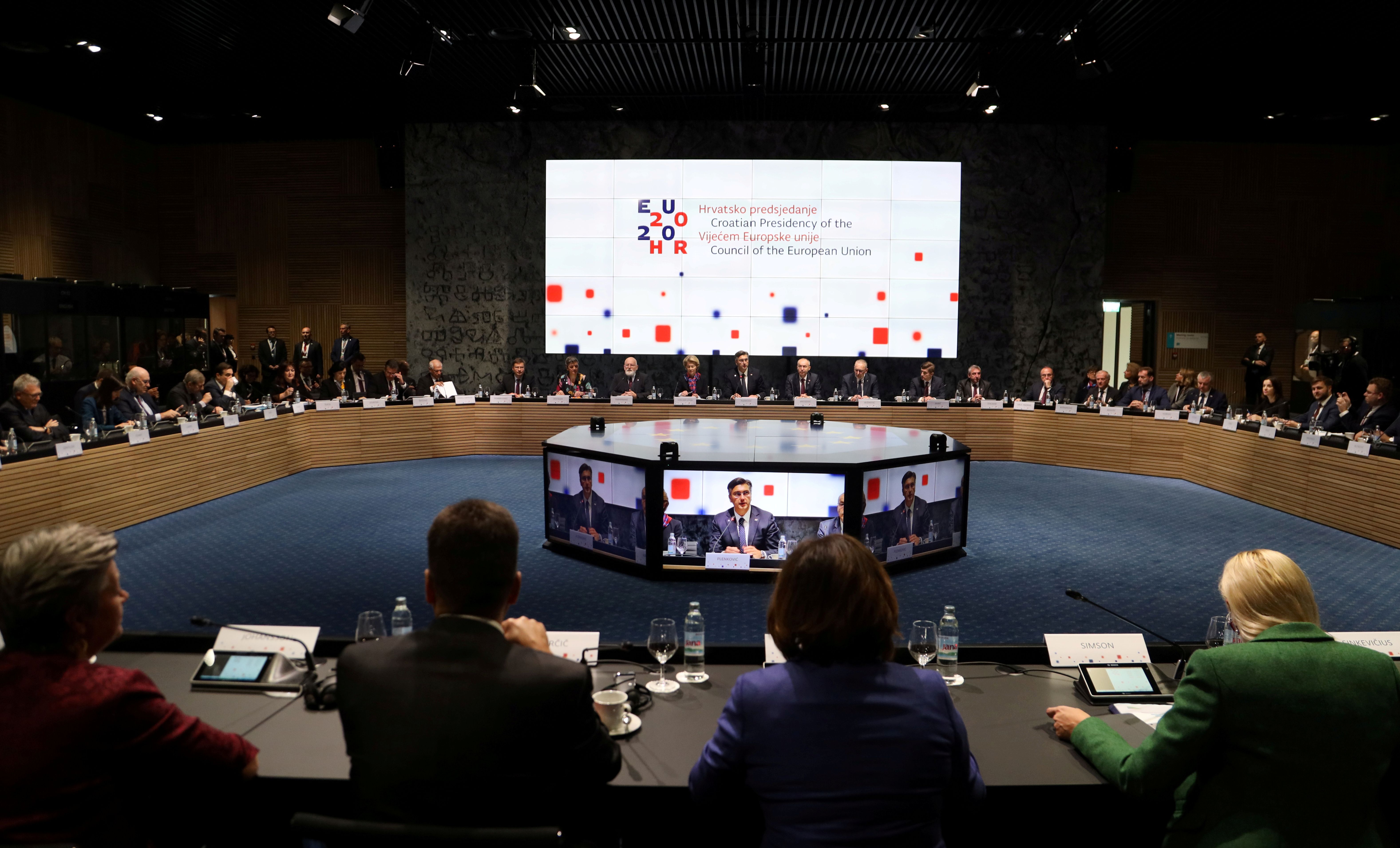
Settings
In Croatia, the minority cabinet of Andrej Plenković from the conservative Croatian Democratic Community has been ruling since 2016, and since 2017 in a coalition with the social liberal Croatian People’s Party-Liberal Democrats. After Bulgaria and Romania, the country is least developed in the Union and benefits from cohesion policy. Its location between Central Europe and the Balkans, as well as historical and economic connections, result in consensus on the Croatian political scene regarding the need for European integration of the Western Balkans.
Croatia’s presidency began after the establishment of EU institutions in the new composition. Their most important task this year will be the adoption of the MFF for 2021-2027 and the development of a common negotiating position towards future EU relations with the United Kingdom. The presidency also coincides with the planned revision of EU enlargement policy and a planned conference to debate key future issues of the Union.
Programme Goals
The presidency, under the slogan “A strong Europe in a world of challenges”, has similar programme objectives to the just-finished Finnish presidency. In order to achieve sustainable economic development of the Union, Croatia promotes in the presidency programme not only a closer connection of the Member States’ economies and considering both their potential and specificity but also strengthening environmental protection and countering climate change. To these ends, it has announced the coordination of the EU Council’s activities for the European Green Deal—presented by the European Commission in December 2019—in such a way as to secure financial resources for the implementation of the initiative.
Croatia wants the Union to protect EU external borders more effectively and increase its resistance to hybrid and cyber threats. As a transit country during the mass-migration crisis in 2015, it supports further work on a common migration and asylum policy. It also believes that the stability of the EU depends on its development as an area of freedom, security, and justice based on common values, democracy, and the rule of law. In addition, Croatia assumes that no Member State can meet the challenges on the international stage alone. That is why it promotes European integration in order to confirm the role of the Union in a multipolar world.
Coordination of EU Work
The presidency continues the work on the EU budget as proposed by the European Commission in May 2018. In the discussion on cohesion policy and the CAP, Croatia advocates considering not only the economic and demographic differences between countries but also new challenges, including climate-related ones. Unlike most Central European countries, Croatia—mainly due to its very low employment rate in agriculture—together with Slovenia did not support the declaration of 17 EU countries on the need to finance the CAP at the current level.
The presidency’s tasks include coordinating the work of the 27 EU countries on a common negotiating mandate to conclude an agreement on the Union’s relations with the United Kingdom after 2020. Therefore, Plenković has announced active intermediation between the European Commission, responsible for EU trade relations and for preparing the project mandate, and the foreign ministers of the Member States, who negotiate its content and scope.
For May, the presidency will organise an EU summit with the Western Balkans in Zagreb. To increase its importance, Croatia is keen to set a date for the start of accession talks with Albania and North Macedonia during the March European Council. In January, Plenković tried in Paris to win over French President Emmanuel Macron, the main opponent of EU enlargement. Then, in Berlin, he received support from German Chancellor Angela Merkel in this regard. The Eastern Partnership summit planned for June does not coincide, however, with Croatia’s priorities, so it will not be held in Zagreb but in Brussels.
Croatia will host the May conference in Dubrovnik, the first of a series on the future of the EU. As a small country, it emphasizes that the debate must guarantee the equal participation of all Member States. The involvement of Croatia is to be facilitated by the Commission vice-president for Democracy and Demography, Dubravka Šuica, nominated by the government of Plenković and responsible for preparing the conference on behalf of the EC.
Conclusions for Poland and the EU
The central event of Croatia’s presidency will be the EU summit with the Western Balkans. This is because it overlaps the priorities of the country’s foreign policy and the challenges facing EU enlargement, and the summit priority seems to be confirmed by the actions undertaken already at the beginning of the presidency. The government’s ambition is for the Zagreb summit to be a real new opening in the Union’s relations with the region. That is why it is seeking not only to set a date for the commencement of accession talks with Albania and North Macedonia but also to formulate a strong EU message about tangible opportunities for enlargement. This position coincides with the interests of Poland in the Balkans. On the other hand, because of Croatia's low involvement in the Eastern Partnership summit, which is not ideal from the Polish perspective, Poland may want to cooperate with the presidency to both maintain the ambitious assumptions of the programme and guarantee a high-level meeting.
Although Croatia’s most important task in coordinating EU work will be the MFF talks, it is unlikely that the budget will be approved in the first half of the year. Therefore, the real goal may be to make progress in negotiations on spending rules rather than on the budget’s size. The position of the Polish government coincides with Croatia’s support for maintaining a generous cohesion policy but not with its aim of a reduction in the current financing of the CAP. Although the Croatian presidency’s programme includes rule-of-law issues, this is more because they were among the objectives of the presidency trio agreed jointly with Romania and Finland than Croatia’s determination. That is why, unlike the Finnish presidency, it is unlikely that Croatia will pursue further proceedings under Art. 7 of the Treaty on European Union and will remain neutral as regards connecting budgetary matters with adherence to the rule of law.
The Croatian presidency will pay more attention than the Finnish one to the difficulties arising from the nature of the energy system that the countries of Central and Eastern Europe must face in the context of climate policy. These countries may turn out to be beneficiaries of the need to adapt funding for implementing the European Green Deal to the specificities of their economies—something promoted by Croatia.
Croatia could become involved in coordinating work on developing a negotiating mandate in the Council of the EU for an agreement on UK relations with the Union. Progress in this area could be counted as a success of the Croatian presidency. However, cooperation between the presidency of the EU Council and President of the European Council Charles Michel in the preparation of the Union's mandate will depend not only on Croatia’s assessment of the chances of agreement among the Member States but also on its ambition in this field. There is no well-developed EU practice of inter-institutional cooperation in this unprecedented case. However, the Croatian presidency will not play a role in the negotiations themselves of the agreement with the United Kingdom, which is the task of the president of the European Council and the European Commission.
As for the other Central and Eastern European countries, for Croatia, the debate on the future of the EU is not a priority. On the other hand, Croatia’s organisation of a conference on this subject may prove to be an effective element of the negotiations, for example, in the talks on the future of European integration of the Balkans with France, which is one of the biggest supporters of the debate on the Union and opponents of enlargement. Commissioner Šuica’s responsibility for preparing the conference should be seen as Croatia’s opportunity to link these issues in a favourable way.




